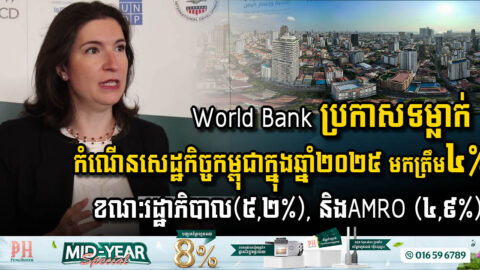The Hypothec Revolution
The Cambodian Law on Application of the Civil Code was implemented in 2011 and abrogated some provisions of the 2007 Civil Code, and the 2001 Land Law. The new law has significantly impacted the structuring of business operations related to security rights, including for financial institutions providing credit.
“The new law divides mortgage loans (guarantee) into two categories; Pledge and Hypothec none of which allow the creditor to possess the debtor’s title deed,” Sok Piseth, head of Canadia Bank’s Foreign Business and New Business Development Department explained.
Mr. Sok Piseth, Head of Canadia Bank’s Foreign Business and New Business Development Department
With Pledge loans, a creditor has the right to control and use the property without imposing interest rate to debtor, and after recording the loan on the title registered at the relevant Cadastral offices, the creditor must return the hard title deed to the debtor. For Hypothec loans, the debtor can control and use the property, but has to pay interest to the creditor. After registering the loan record, the debtor can take the hard title deed back.
From now on, financial institutions must independently explain these two choices to customers applying for a loan.
The new law also eliminates the ‘Gage’ practice, established under the 2001 Land Law, and replaces it with the Hypothec system. To explain this, a Gage/Hypothec seminar, attended by 250 officials and bankers, was hosted in Phnom Penh in December 2011 by Prof. Toyohiro Nomura of Japan’s Gakushuin University, who drafted the Security Rights section in the new Civil Code.
Prof. Nomura said the ‘Gage’ system was now abrogated and the Hypothec system has been created in its place to secure the performance of a debtor. Gage and Hypothec are similar in that the creditor does not possess the immovable, but in Hypothec the creditor does not hold the certificate of title. As a result, the system of security rights in Cambodia has dramatically changed.
Keo Vanny, a Cambodian Law Lecturer, explained that under the new Civil Code only immovable property is subject to Hypothec where parties agree that a debtor still controls their property and title. However, to assert against a third party, an authentic form of contract and registration are absolutely necessary for a creditor. “The purpose of the amendment is to make the economic status or living standard of the debtor better,” he said.
Mr. Keo Vanny, Cambodian Law Lecturer
The new law which mirrors the Japanese legal system has both good and bad sides, argue lawyers and bankers.
Vanny explained that a debtor can gain an advantage by creating more Hypothecs on the same immovable property to get loans with the same or different creditors. For example, A has a plot of land worth US$40,000. On 20 June 2014, A needed money to expand his business transactions, so he made a loan agreement with Bank B for US$10,000, providing his land for security in the form of Hypothec.
On 24 June 2014, A needed more money to expand his business transactions, so he made a loan agreement with Bank C for US$10,000, providing his land for security in the form of Hypothec. On 27 June 2014, A needed more money to expand his business transactions, so he made a loan agreement with Bank D for US$10,000, providing his land for security in the form of Hypothec.
Vanny also worries that creditors can face disadvantages if they can’t keep property titles that complex legal relationships and lawsuits could arise. For example, in the cases mentioned above, if A fails to perform the obligation for Bank B, that bank will request the court to sell the land. Then, the other Banks, C and D, will join Bank B in the court procedure. Furthermore, the debtor A is allowed to sell this land, although it’s provided for security. After the sale, if A fails to perform the obligations for the Banks, they will request the court to sell the land belonging to a buyer, not belonging to A anymore. In this case, the lawsuit will be more complex.
Priority creditor with multiple retentions
With the above multiple retentions over the same property as allowed by this new law, financial institutions are potentially facing the risks of offering loans to customers who create multiple Hypothecs with other creditors.
In such cases, the first creditor to register the loan where the title is registered will have first priority to claim back compensation from the property if the debtor fails to pay back the loan. The last creditor, by chronological order or loan registration, will have the least priority to claim compensation.
Under the new law, creditors need to request an annual delay in the Hypothec validity to the Cadastral office so debtors can repay on time. If the first creditor fails to request a delay on the contract until a debtor pays back the loan, the law automatically dissolves the first creditor’s right over the property and transfers the priority to the next creditors based on chronological order of loan registration.
“What if the creditor is reluctant and fails to request to delay the Hypothec validity before the debtor repays the loan? This means creditors will face a high risk of losing their money,” Canadia Bank’s Piseth said.
This system works well in countries like Japan where a commercial court can grant rights to creditors to auction the property to recoup money. But in Cambodia, where there is no commercial court and lengthy complaint procedures involve with three classes of courts, this system can be a nightmare for creditors, he added.
However, according to DFDL – an international law firm established since 1994 – the Civil Code indicates the priority of some specific creditors under the following circumstances (i) preservation of an immovable property (ii) work on an immovable property or (iii) sale of an immovable property.
“Where there are multiple retention rights created, their respective priority rankings shall follow the order specified above. The preferential rights shall be registered with the Cadastral offices,” DFDL’s website states.
“Even without registration, such preferential rights shall prevail for a creditor who has no specific security over the immovable property. The preferential right created under the preservation of an immovable property and the work on an immovable property shall be prioritized over Hypothec,” it continues.
The amended law can also create challenges and more expenses for both creditors and debtors when loan proposals are created. Banks now need to prepare Hypothec registration renewal annually, whereas in the past registration was valid for 5 years.
ACLEDA Bank Plc., the nation’s largest commercial bank, is also hurting from the new Hypothec system. Long Horng, the bank’s Assistant Senior Vice President of Marketing Division, said the law had forced the bank to process loan disbursements over a longer period of time and amend some existing procedures to comply with the new Hypothec.
The law has caused increased complications for customers because more documents are needed, a title deed can only be taken and released once, the renewal process is longer, and customers feel uncomfortable about revealing the loan size/amount in the Hypothec contract.
“To ensure the bank will get back the money, ACLEDA assesses the customer’s loan repayment capacity based on the cash flow and income from business. The collateral is the second priority,” he said.
Chea Serey, NBC’s Director General agreed the law brings both positives and negatives. Despite the change allows borrowers to choose a lender more efficiently, she admits that bringing this sophisticated practice from Japan does pose challenges to Cambodia which is still a young country in many ways.
Ms. Chea Serey, National Bank of Cambodia’s Director General
The lack of a centralized land registry system means that not all land offices in the country know what happens to a particular plot of land, she said.
“If a plot of land in Kandal province is hypothecated to a bank in Siem Reap, the Cadastral office in Siem Reap must be able to see on their system whether this land has not already been hypothecated somewhere else in the country and then register the priority charge,” she said. “And upon enforcement of such charge the court must follow the priority order.”
All land registrations are currently recorded manually in Cambodia. If a customer declares a title deed lost after the bank returns it, then the authority must issue a new one, but the original information might be lost, leading to a costly and extensive research process.
Banks claim that this practice is altogether too risky for them. They worry about giving back hard titles to customers; particularly if they plan to use them with other banks who might register with different cadastral offices unaware of the first charge. This can become a big problem if customers default because neither bank is aware of the other banks’ charge which could lead to protracted court proceedings, she stressed.
Because of these hurdles to the banks, the implementation of the amended Civil Code was halted for a few years after its enactment upon request by the banking sector, but in April this year, the Ministry of Justice introduced a letter to re-enact the civil code again specifically on Hypothec.
The Association of Banks of Cambodia (ABC) which represents commercial banks in Cambodia with relevant stakeholders has requested the government, via the National Bank of Cambodia (NBC), to push the implementation back further because the banks have encountered problems when they register their collaterals, due to a lack of adequate information and understanding on the new procedures across different cadastral offices in the country.
Serey believes the government’s recent initiative to issue hard titles to people in rural areas will benefit both the people and the creditors. “The establishment of a credit bureau under the NBC’s purview will also help provide additional tools for financial institutions to assess customers’ creditworthiness and price loans accordingly.”
To improve the law, Long Hong of ACLEDA Bank suggested Land Management Department accelerate the process of new Hypothecs so customers can get loans quicker. Sok Piseth recommends property buyers comprehensively check the legal ownership of property or if property has any Hypothec or mortgage registered on it elsewhere. If buyers fail to check, they may be victims.
Law lecturer Keo Vanny takes a neutral stand on this new law, saying that, “I am of the view that the law always protects a person with good faith in the transaction. If we compare and contrast the advantages and disadvantages, in spite of some disadvantages, currently, I do not have any comments for improving this law yet, because it is a new law.”
- Video Advertisement -



 ខ្មែរ
ខ្មែរ







